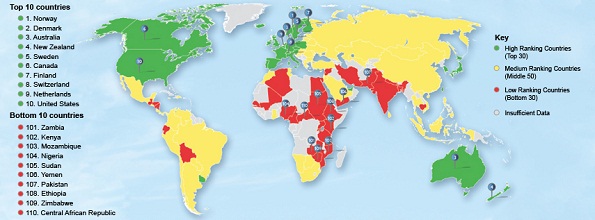
Six European nations have made their economic way into this year’s Top 10 Properity Index, a worldwide assessment of wealth and quality of life, although only two of them belong to the European Monetary Union. Out of 110 countries, Norway and Denmark lead the rankings, ahead of Germany (15) and France (18).
The Legatum Prosperity Index provides the world’s only global assessment of national prosperity based on both private and public finance, and well-being. The Index assesses states accounting for over 93% of the world’s population and 97% of the world’s GDP. The Index’s list is based on their performance in eight sub-indices, including economy and governance but personal freedom and social capital, too.
The UK, the biggest European Union member that doesn’t share the common currency, has improved its Prosperity Index score by 13% over the past two years and ranks fourth in the entrepreneurship & opportunity sub-index, which measures how countries perform in entrepreneurial environment, innovative activity, and access to opportunity. In terms of overall score, the UK is the most improved country in western Europe over the past two years.
Greece and Italy each dropped four places. While most European countries’ absolute Index scores have remained stable despite the financial crisis, Italy is among a small group of countries globally whose absolute Index score has dropped since 2010.
Jeffrey Gedmin, President and CEO of the Legatum Institute, says that
“We want to assess the long term drivers of prosperity. The Prosperity Index is designed to be a practical tool for researchers, policy makers, media, and the interested public. We hope this year’s findings will contribute to the conversation about what makes societies healthy and successful.”
Across Europe, a gap has opened up in areas of social capital and governance, which are crucial indicators measuring a country’s resilience to economic shocks and social disruption. While the countries at the top of the Index have remained stable on this front, peripheral states like Portugal, Italy, Greece, and Spain report high levels of corruption, low rates of social trust, low levels of rule of law, and inefficient public sectors, which suggests that their foundations for economic recovery may be weaker than elsewhere in Europe. For the first time, some of the new EU members from Central and Eastern Europe – led by Slovenia, Czech Republic, and Poland – outperform the so-called peripherals on these indicators.
France shows a decline similar to the peripherals’ on certain variables associated with the economy sub-index, such as lower gross domestic savings rates, higher rates of non-performing loans, and more people lacking adequate access to food and shelter, despite its less troubled economy.
* The source of all data in this post is Legatum Institute.





Be the first to comment on "Europe scores a win in the Top 10 Prosperity Index, but not the euro"